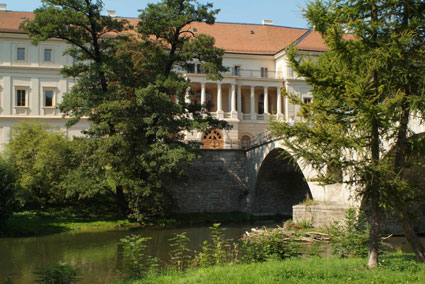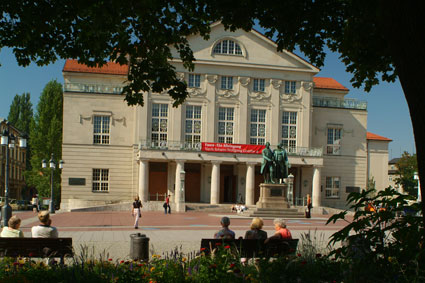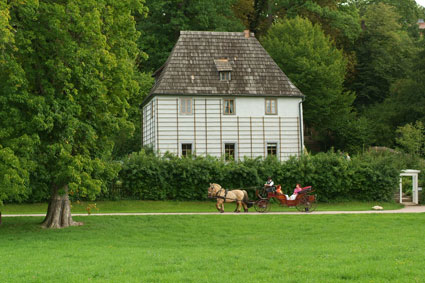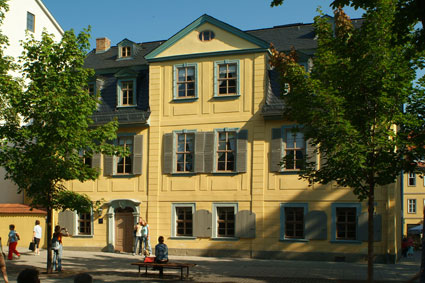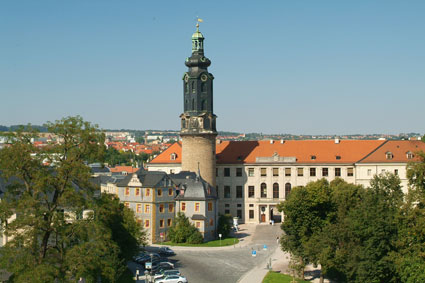|
Basic data:
Population: 64.720 (31.12.2007)
Area: 84.27 square kilometre
Museums Total: 25
Foundation of the “Foundation Weimar Classicism”: 12
Visitors per year: approximately 2 million
Data History:
899 First mention of “Wimare” ( "sanctified place")
975 Emperor Otto II mentions the fortified settlement of Weimar in a historical document, which is considered the birth certificate of the city
1168 The first building of St. Jame’s Church is being sanctified
1250 City's founding "in civitate nostre Wimar”. The place is a settlement of farmers and artisans at this time.
1410 Award of the city law
appr. 1430 Construction of the first town hall
1485 Weimar becomes a residence of the Saxon Court
1525 The reformation succeeds: Weimar becomes Protestant
1552 Elector Johann Friedrich moves into town , a well as Lucas Cranach the Elder, who comes to settle by the Ilm River1653 First mention of the onion market
1708 Johann Sebastian Bach was appointed concert master
1741 Weimar becomes the capital of the duchy of Saxe-Weimar-Eisenach
1756 Duke Ernst August Constantin marries Anna Amalia
1758 the Duke dies. His widow, Anna Amalia assumes the regency for her one year-old son Carl August
1772 The poet Christoph Martin Wieland comes as prince educators to court
1774 The castle burns
1775 Carl August assume the regency; Goethe comes to court
around 1800 The so-called "Golden Age", culmination of German classicism
1825 Opening of the new court theater
1828 death of Grand Duke Carl August
1832 Goethe dies. He is buried in the royal crypt
1842 Franz Liszt appointed as director of music at Weimar Court
1848-1902 So-called "Silver Age", period of great cultural achievements in music (Liszt, Strauss), architecture, literature
1857 The Goethe and Schiller Statue is unveiled on theater squre.
1907 The Art Nouveau architect Henry van de Velde foundsthe art school (in 1917 he goes to exile)
1918 Grand Duke (since 1901) Wilhelm Ernst resigns
1919 Die National Assembly meets from February to August at the Court Theater (then called the National Theater) and decides the first democratic constitution (the "Weimar Republic")in Germany. Walter Gropius founds the Bauhaus.
1920 Weimar, becomes the capital of the state of Thuringia (until 1952).
1926 First national congress of the Nazi-Party held in Weimar , Weimar becomesdistrict capital
1937 On a nearby hill, the “Ettersberg”, the concentration camp Buchenwald is established
1945 Destruction by an air raid. Capitulation. Liberation of Buchenwald. (ongoing utilization of the concentration camp by Russian allies until 1950’s)
Thuringia is assigned to the Soviet zone.
1948 The National Theater reopens
1975 1000 years anniversary of the city
1988 Opening of the Schiller Museum, the only museum building that dates to the era East Germany
End October 1989 demonstrations against the communist regime on the “Square of democracy “
03. October 1990 restoration of German unity
1999 Weimar is awarded the status "European City of Culture 1999” (the smallest city ever awarded to date)
2004 Weimar official bearer of the surname "University City"
|


